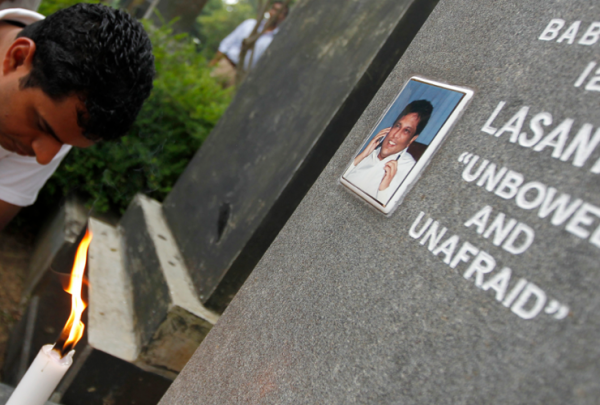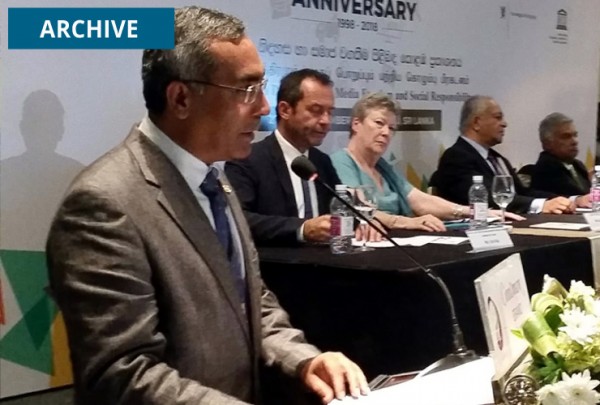Her Excellency Chandrika Bandaranaike Kumaratunga
President, Democratic Socialist Republic of Sri Lanka
Presidential Secretariat
Colombo-1
Sri Lanka
Fax: +94 1 333 703
Vienna, 26 July 2001
Your Excellency,
The International Press Institute (IPI), the global network of editors and media executives, is deeply concerned at the use of the Sri Lankan criminal defamation laws to intimidate Victor Ivan, the editor-in-chief of the Ravaya newspaper.
According to information presented to IPI, Ivan, a respected journalist in Sri Lanka who has been honoured for his work by the University of Colombo, the Colombo Law College and the Editors Guild of Sri Lanka, is currently facing four separate criminal defamation charges. A fifth criminal defamation charge was settled in early July. In addition, Ivan has filed a number of petitions to have the charges against him annulled and is fighting a complex legal action over a Ravaya article alleging the rape of a woman by a magistrate.
Regarding the criminal cases, all of which concern articles in the Ravaya newspaper and were issued in the High Court, Case No. 8650/97 was filed by the Attorney General for an article detailing the alleged corrupt conduct of a police officer. The next hearing in this action will be held on 12 September 2001. Case No. 9128/97 was filed for a news article published on 22 December 1996 that detailed apparent abuse in a children’s home. A hearing in this action will be heard on 23 October 2001. Case No. 168/2000 was issued by the Attorney General for a series of articles discussing the administration of the Dalada Maligawa, a Buddhist temple. A hearing in this action has been set down for 1 August 2001. The final outstanding criminal defamation charge, Case No. 182/2001, will have its next hearing on 10 September 2001 and concerns an article alleging misconduct on the part of the deputy-minister of health.
All of the outstanding criminal defamation charges have been laid down under either section 479 or section 480 of the Sri Lankan Penal Code. The sections were introduced during British rule and are similar to the laws in other Commonwealth countries. If found guilty, Ivan faces a maximum sentence of two years imprisonment.
In the opinion of IPI, when viewed as a totality, these criminal defamation charges provide disturbing evidence of a concerted campaign by the Sri Lankan government against Ivan. A view which is supported by the January 2000 television interview given by Your Excellency, in which you made a series of allegations against Ivan. Later in January 2000, the director of the Presidential Security Division, Superintendent of Police Karunaratna, told the Free Media Movement that Ivan was No.2 on their hit list after Lasantha Wickrematunga of the Sunday Leader. Shortly after this comment, senior government ministers in Colombo started to accuse Ivan of conspiring with the Liberation Tigers of Tamil Ealam (LTTE). The comments were later picked up by the state press and carried in a series of articles. Ivan has always vigorously denied the allegations.
With regard to the application of criminal defamation laws, IPI firmly believes that they have no place in a modern democracy. Criminal defamation has the effect of unfairly stigmatising journalists for carrying out their professional duties. In addition, the threat of imprisonment encourages self-censorship and is detrimental to society as a whole because it prevents the media from discussing many important but, often uncomfortable, issues. Furthermore, civil defamation laws offer an alternative and are untainted by the profound consequences for press freedom that criminal defamation laws imply.
IPI also wishes to point out the incompatibility of applying criminal defamation laws while being a party to international obligations which emphasise the right to freedom of expression. Sri Lanka is a party to the International Covenant on Civil and Political Rights, which, under article 19, states, “Everyone shall have the right to freedom of expression; this right shall include freedom to seek, receive and impart information and ideas of all kinds, regardless of frontiers”. Although the section further states that there must be respect for the “rights to reputations of others”, IPI strongly believes that, in the cases brought against Ivan, both he and the Ravaya were motivated by the public interest.
IPI calls on Your Excellency to invite the Attorney General to withdraw his charges against Ivan and to put into effect plans to annul the criminal defamation laws currently on the statute books. By doing so, you will be affirming press freedom and encouraging the important work of investigative journalism in Sri Lanka.
Best regards,
Johann P. Fritz
Director


